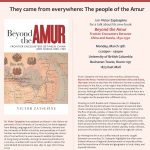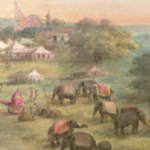Beginning in the Song dynasty (960-1279) cities and urban life in China began to be represented in new ways, and in ever greater abundance. Maps of cities began to be produced and circulated in new formats and contexts, including gazetteers, guidebooks, and travel narratives. This talk will explore a variety of images of cities, including […]
You’re welcome to join us whatever your background or interest in Classical/Literary texts. We will be reading primary sources, generally connected to the participants’ research interests, with a center of gravity in the Ming but by no means exclusive to that period (hence the name). The goal is to work together on language skills, to […]
By: Aaron Skabelund (Brigham Young University) Abstract: This presentation uses Spivak’s famous query to explore human-animal relations in three ways. First, from an epistemological perspective, it considers why researchers in the social sciences and the humanities have directed their attention almost entirely to human affairs, relegating the study of the non-human world to the natural sciences. […]
 From Imperial Engineers to Development Consultants: Japanese Engineers and the Post-Colonial, Cold War System of Development in South Korea
From Imperial Engineers to Development Consultants: Japanese Engineers and the Post-Colonial, Cold War System of Development in South Korea
Until now, work on Japan’s colonial legacy of industrialization in Korea has focused on whether or not Japan laid the foundation to South Korea’s post-war economic growth. Much of this work, however, has largely been defined by a nation-based understanding of economic development (e.g. the “miracle on the Han” narrative), which either asserts discontinuity or […]
 They Came from Everywhere: the People of the Amur
They Came from Everywhere: the People of the Amur
About the Speaker: Victor Zatsepine grew up in Samara, Russia, where the Volga River crosses the Trans-Siberian Railway. From 1989 to 1993, he was an exchange student in Beijing, majoring in Modern Chinese, and later working as a researcher for major US media outlets. After finishing his MA at Harvard (1998) and PhD at the […]
 The Great Hydraulic Transition: Colonial Engineering and the Making of Modern Rivers in South Asia
The Great Hydraulic Transition: Colonial Engineering and the Making of Modern Rivers in South Asia
This event is in collaboration with the Interdisciplinary Histories Research Cluster, and is co-sponsored by the Department of History, and the Graduate Program in Science and Technology Studies.